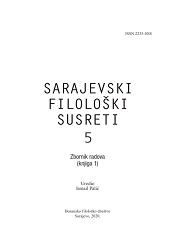Hrvatske nefinitne infinitivne klauze
Croatian Nonfinite (Infinitival) Clauses
Author(s): Branimir Belaj, Goran Tanacković FaletarSubject(s): Syntax, Semantics, South Slavic Languages
Published by: Bosansko filološko društvo
Keywords: nonfinite infinitival clauses; finite clauses; relational object and subject clauses; purpose clauses;
Summary/Abstract: Unlike the grammars of many other languages (e.g. English and German) where nonfinite clauses are an unequivocal and well-established fact of grammar, not a single reference grammar of Croatian, or of any other Shtokavian standard for that matter, treats infinitival complements as independent clauses. They are always treated as predicate complements on the assumption that nonfinite forms alone cannot build predicates, and by extension sentences either. Using the methodology of cognitive grammar (Langacker 1987, 1991, 2008, Taylor 2002, Belaj and Tanacković Faletar 2014, 2017) in this study we deliver arguments from the syntactic (subject and object control) and semantic court (opposition between type / grounded instance; summary / sequential scanning, effective /epistemic level of grounding), to support the claim that the infinitive, as one of nonfinite forms, may be regarded as an independent clause, depending on the meaning of the verb it complements. We will establish a predicate continuum, i.e. a predicate hierarchy, which runs on one end from predicates which include in their structure a synsemantic verb (modal and phasal), all through those built around autosemantic verbs, on the other end of the hierarchy. Being that with predicates featuring synsemantic verbs and the infinitive we cannot claim the existence of two separates events, we shall interpret such infinitives as predicate complements. On the other hand, in constructions with autosemantic verbs, the infinitive will be treated as a separate clause. This is mainly the case with some relational complements and purpose clauses (e.g. Čuli smo ih da / kako pjevaju / Čuli smo ih pjevati (We heard them lit. that / how (they) sing / We heard them (to) sing); Obećao sam mu da ću doći na proslavu / Obećao sam mu doći na proslavu (I promised him that I would come to the party / I promised him lit. to come to the party); Svratili smo da vas pozdravimo / Svratili smo vas pozdraviti (We stopped by lit. that we say hi to you / We stopped by to say hi to you)), where the distinctions between finite and nonfinite clauses will be discussed in terms of the mentioned semantic oppositions.
Journal: Sarajevski filološki susreti: zbornik radova
- Issue Year: 5/2020
- Issue No: 1
- Page Range: 99-122
- Page Count: 24
- Language: Croatian

